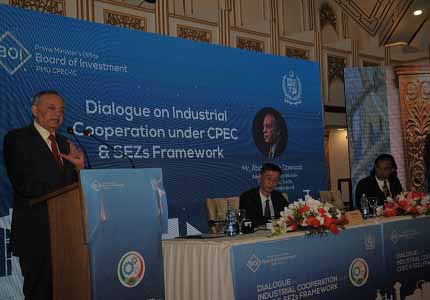Framework Agreement on CPEC-IC to help SEZs development: Chairman BOI

Islamabad: The Minister of State and Chairman Board of Investment (BOI) Atif R. Bokhari on Tuesday said that signing of a mutually beneficial Framework Agreement on Industrial Cooperation (IC) under China Pakistan Economic Corridor (CPEC) would realize the vision of special economic zones’ (SEZs) development, ultimately leading to a prosperous and industrial country Pakistan.

He expressed these views while addressing to a Consultative Forum on Draft Framework Agreement on IC under CPEC, organized by Project Management Unit (PMU), BOI ,said a press release issued by BOI here.
The conference was attended by Secretary BOI, Ms. Fareena Mazha , officials from line ministries and provinces, academia, and representatives of different chambers of commerce and associations.
Chairman BOI said that the first phase of CPEC required the leading role of the government, while the second phase requires a 180-degree change in management and roles of actors.
“It calls for enhanced role of industrialists, the private sector, and the business community, while the government’s role would only be that of a facilitator by devising effective policies, laws, and efficient infrastructure, to facilitate B2B and people to people linkages, ”he pointed out.

Atif said that the draft Framework Agreement on IC is being aligned with the long-term framework of CPEC. “A world of opportunities will open up by setting the fundamentals of Industrial Cooperation under CPEC and it is high time for all of us to tap the right opportunities at the right time” he affirmed.
He appreciated PMU of BOI on CPEC IC for obtaining stakeholders’ input and organizing this consultative forum with the true essence of an all-inclusive approach to devise a bona fide document that will create a pragmatic impact on the country’s economy.

He informed that significant progress has been achieved on SEZs development and colonization during the last few months wherein 04 CPEC SEZs; Rashakai SEZ in Khyber Pakhtunkhwa, Dhabeji SEZ in Sindh, M-3 Allama Iqbal SEZ, Punjab, and Bostan SEZ Balochistan are now in advance stage of development.
The geographical proximity between China and Pakistan will allow these SEZs to foster economic interdependence for mutual economic advantage, he added.
Secretary BOI, Ms. Fareena Mazhar while highlighting the role of BOI being a lead agency for IC under CPEC, shared the journey of CPEC and its future action plan, conceived for its second phase that includes development of SEZs agricultural cooperation, relocation of Chinese industries into Pakistan, public private partnerships for business prospects and creation of vocational training and employment opportunities.
She said that Pakistan and China are agreed to elevate the MoU on IC into a Framework Agreement that are focusing on SEZs development and B2B joint ventures as core elements of IC under CPEC.
She informed that serious efforts for provision of gas and electricity are underway to ensure these basic utilities alongside development of Rashakai SEZ, Allama Iqbal Industrial City, Faisalabad and Dhabeji SEZ.
The Project Director of the Project Management Unit (PMU) on Industrial Cooperation under CPEC, of BOI, Mr. Asim Ayub, briefed the participants on the journey of CPEC IC and the salient features of the Draft Framework Agreement on Industrial Cooperation.
Dr. Shazia Ghani, Team Lead Prime Minister’s Office, Hafiz Abdul Majid, Secretary, Industries and Commerce, Balochistan, Hassan Daud Butt, CEO Khyber Pakhtunkhwa Board of Investment and Trade, Abdul Azeem Uqaili, CEO Sindh Economic Zones Management Company, Mudassir Tipu, DG China, Ministry of Foreign Affairs, Dr. Liaquat Shah, Project Director CPEC Authority, Mr. Muhammad Aslam Chaudhry, Joint Secretary, Economic Affairs Division, Dr. Talat Shabbir, Director China-Pakistan Study Center, Institute of Strategic Studies, Asim Ayub, Project Director PMU-CPEC IC. Abdul Samie Manzoor, Director BOI and others also spoke on the occasion.
The framework is being developed with a special focus to enhance industrial competitiveness of Pakistan, ensure technology transfer, and relocate Chinese businesses and skill development and labor productivity.
The modus operandi of the cooperation would likely enhance business to business (B2B) and project to project (P2P) ties ensuring projectized mode of I.C (Medium and Long-Term Projects), balance and modernize existing industry, make joint efforts to expedite SEZs development and its promotion, seek technical and financial assistance from China, enhance production capacity, facilitate businesses by financial institutions from both sides and ensure joint marketing and media efforts to promote I.C and SEZs.





